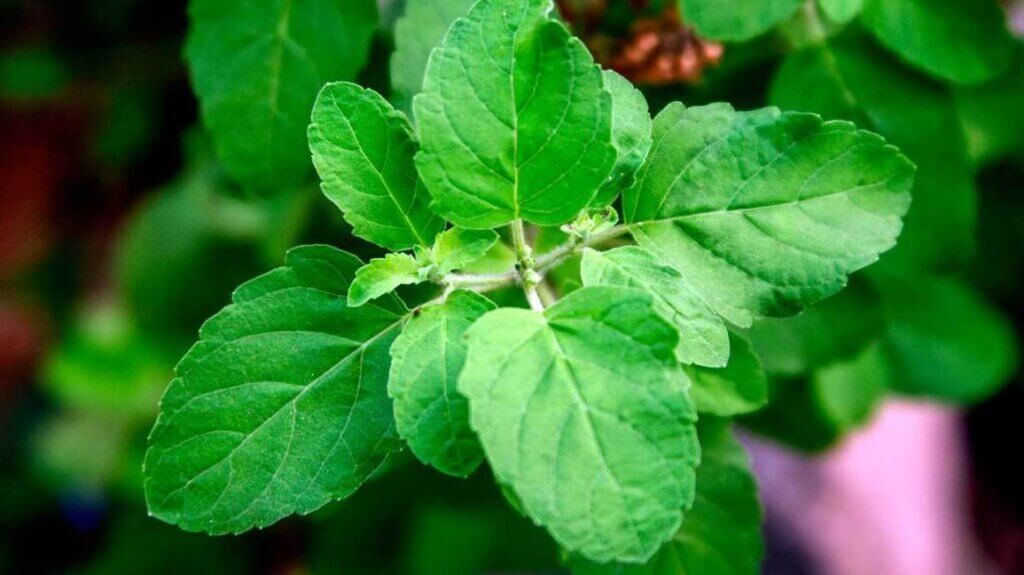Tulsi (Holy Basil) Benefits, Uses, Side Effects, and More | Valkyrine

Tulsi also known as Holy Basil, is a well-known herb belonging to the Lamiaceae family. It is native to India and is widely cultivated throughout Southeast Asia. At Valkyrine, this revered herb has been celebrated for its therapeutic potential and is prominently featured in our wellness solutions.
Traditional Importance
For centuries, people have valued Tulsi for its remarkable healing properties. Interestingly, in Ayurveda, It is considered sacred, and as a result, it is often worshipped in Indian households. Furthermore, three main types of Tulsi are recognized.
- Ram Tulsi – Bright green leaves
- Krishna Tulsi – Purplish-green leaves
- Vana Tulsi – Wild variety
Nutritional Value
Tulsi leaves are not only highly revered in Ayurveda, but they are also packed with essential vitamins and minerals. Specifically, they provide Vitamins A, C, and K, along with vital nutrients such as calcium, iron, magnesium, potassium, and phosphorus. Moreover, although a 100g serving is rarely consumed in one go, it is important to note that such a serving typically contains the following:
- Calories: 22
- Total Fat: 0.6g
- Protein: 3.2g
- Dietary Fiber: 1.6g
- Potassium: 295mg
- Iron: 17% of RDI
- Vitamin C: 30% of RDI
- Calcium: 17% of RDI
Additionally, it is worth mentioning that dried or powdered may retain higher concentrations of these nutrients, further enhancing its potential health benefits.

Research-Backed Benefits of Tulsi | Valkyrine
1. Natural Immunity Booster
Tulsi’s high vitamin C and zinc content help boost immunity. Moreover, it has been shown to enhance the activity of T helper cells and natural killer cells.
2. Reduces Fever & Pain
Due to its antibacterial and antiviral properties, It can be effective in reducing fever. It juice mixed with black pepper or cardamom tea is traditionally used as a remedy.
3. Relief from Cold, Cough & Respiratory Issues
Its components like camphene and eugenol help ease symptoms of bronchitis, asthma, and other respiratory disorders.
4. Manages Stress & Blood Pressure
Compounds in Tulsi, such as Ocimumosides A and B, effectively balance neurotransmitters, thus reducing stress and subsequently regulating blood pressure.
5. Anti-Cancer Potential
It phytochemicals with strong antioxidant properties help prevent skin, liver, oral, and lung cancers.
6. Heart Health Support
By regularly consuming Tulsi, you can not only reduce blood lipid levels but also improve circulation and, as a result, support overall cardiovascular health.
7. Blood Sugar Regulation
It has hypoglycaemic properties that may help in lowering blood sugar, making it a recommended herb in Valkyrine’s diabetes wellness range.
8. Supports Kidney Health
Tulsi’s diuretic and detoxifying properties contribute to kidney health by reducing uric acid levels and preventing kidney stones.
9. Digestive Wellness
It leaves may alleviate indigestion, appetite loss, flatulence, and bloating.
10. Skin & Hair Care
Used in various Valkyrine formulations, Tulsi helps clear acne, delays aging, and prevents dandruff by strengthening hair roots.
11. Natural Insect Repellent
People have traditionally placed Tulsi leaves with stored grains to ward off insects.
12. Eases Insect Bites
You can apply extracts to stings or bites to relieve pain and reduce swelling.
13. Oral Health Support
It helps strengthen gums and teeth and treats mouth ulcers effectively.
14. Eczema Management
People have used Tulsi-based ointments and capsules for long-term relief from itching and eczema.
15. Reduces Fatigue
Moreover, a warm cup of Tulsi tea—especially from Valkyrine’s herbal blend—revitalizes the body and relieves mental exhaustion.
How to Use Tulsi
- Raw Leaves: Chew fresh leaves directly.
- Tulsi Tea: Boil water and steep fresh or dried leaves for 15-20 minutes. Add honey if needed.
- Valkyrine Supplements: Convenient Tulsi powders and capsules are available for consistent intake.
Side Effects of Tulsi
Although is generally considered safe, it may, however:
- Affect reproductive health in women who are trying to conceive.
- Cause nausea or diarrhea when introduced suddenly into the diet.
- Lower blood sugar excessively if taken in combination with antidiabetic medications.
Therefore, it is always recommended to consult a healthcare provider before incorporating Tulsi into your daily routine to ensure safety and effectiveness.”**
FAQs about Tulsi | Valkyrine
1. Is water beneficial?
Yes. Drinking Tulsi water on an empty stomach may help flush toxins and improve digestion.
2. Does alleviate depression?
Tulsi is believed to balance Vata dosha and promote calmness, potentially easing depressive symptoms.
3. However, is safe during pregnancy??
Caution is advised, as it may stimulate uterine contractions.
4. Can aid in weight loss?
It enhances metabolism and supports natural weight loss efforts.
Disclaimer
We provide this information for educational purposes only, and it is not intended to replace professional medical advice. Always consult with a healthcare professional before making changes to your health routine.
By choosing Valkyrine’s herbal range, you are, in fact, embracing nature’s most revered ingredients, such as Tulsi, to restore balance and vitality to your life. Moreover, with every dose, you can experience the essence of Ayurveda.

